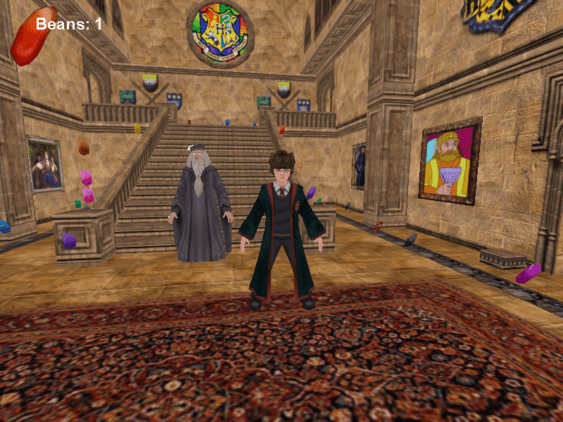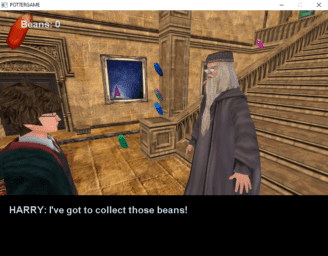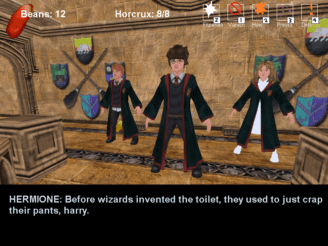In just a few days, open-world Harry Potter game Hogwarts Legacy arrives. That said, much controversy has surrounded the game as of late. People have debated the ethics of purchasing a game tied to series creator and exclusionary feminist J.K. Rowling. And we could continue to debate this until the mooncalves come home. At this point, you probably know if you’re buying the game or boycotting it. But what about those who love Harry Potter but don’t wish to support its creator? What if there was a Harry Potter game that was both controversy-free and economically free? Folks, look no further than POTTERGAME.
Yer a Big Wizard, Big Harry
What is POTTERGAME? Created by developer Kate Barrett, POTTERGAME parodies a specific kind of retro title. Back in the day (and by “the day,” I mean the early 2000s), Electronic Arts published Harry Potter and the Sorcerer’s Stone (or Philosopher’s Stone) based on the film of the same name(s). Due to hardware limitations, the game differed greatly depending on the system and even the year released. 2001 and 2003 both saw games entitled Harry Potter and the Sorcerer’s Stone arrive, even as the latter version debuted after the much improved Harry Potter and the Chamber of Secrets. Though the games of the first film sold well, none of them garnered great reviews.
And so, the first target of POTTERGAME‘s comedy is the shovelware of Harry Potter and the Sorcerer’s Stone. The knock-off Harry Potter game reuses assets from the early titles, gleefully having character models T-pose and clip through walls. In this case, intentionally.
The most egregious of these is Big Harry, an oversized model of Harry Potter’s head clipping through a wall, cosmically watching over the students as if Daniel Radcliffe became Cthulhu. Players explore Hogwarts as regular-sized Harry while interacting with other skewed versions of their favorite characters, striving after one single-minded purpose.
It’s All About the Beans
While a parody of Harry Potter, its lore, its games, and its legacy, POTTERGAME is itself a game. And the goal? Collect. Those. Beans. Fans of the licensed games will remember that players could collect various flavors of Bertie Bott’s Every Flavor beans just lying around the grounds of Hogwarts. Sanitary? No. A fun side objective? Sure. But in POTTERGAME, the beans are the prize. If you get enough, you can enter the Bonus Bean Room. With anything less than a thousand, Neville Longbottom tells you, “I don’t think you’re cool enough to access it.” This coming from Neville. Ouch.
POTTERGAME may offer simplistic gameplay, but its comedy and satire are anything but. The jank-looking game skewers the series and its lore, including where wizards went to the bathroom before the invention of the toilet and how house else love wearing rags, actually. And along the way, it tackles the big question of whether one can separate art from the artist.
The Magical Message of POTTERGAME
A creator makes a work that is beloved by many, but fans learn the unsavory principles of said creator and feel uncertain of whether they can appreciate their work anymore. It’s an old conundrum, for sure. 19th-century German composer Richard Wagner created some of the greatest operas of his time, and his work is still famous to this day. He was also a big-time Nazi before the Nazis were even a thing, making him the worst hipster imaginable. But he is dead and J.K. Rowling is still alive and going off about transgender folks, growing wealthier by the second.
As such, concerned fans appear to have taken two stances. Either you pretend like Harry Potter was never a big part of your adolescence and invent a fake childhood for yourself in which you just really loved The Rainbow Fish, or you hold your nose and give J.K. Rowling that sweet, sweet cash she craves so she can take a dump on you online. Neither position is attractive, but sadly internet discourse lacks nuance. But not POTTERGAME.
In its story, POTTERGAME starts with a typical day at Hogwarts, with Harry gleefully collecting beans, when a malevolent force invades the school. Students can’t use the bathroom, a Dark Souls boss appears, and Dumbledore delivers an epic monologue so ridiculously British that he gets turned into–checks notes–a copy of Love, Actually. The source is Robert Galbraith, the (ironically) male pseudonym of J.K Rowling. He wants the player to care about his plot to instill everyone with outdated British values, but you just want to collect your beans, mate.
It’s here that POTTERGAME makes its point about a beloved work and its problematic creator. Most people really don’t care what an artist has to say beyond their work. J.K. Rowling may go on a new tirade all the time, but nobody bought her books for her opinion; they did it for the characters, story, and world.
In its very existence, as a knock-off of shovelware knock-offs, POTTERGAME shows how one can use art as an inspiration for more art divested from a creator. Kate Barrett clearly knows a lot about the series, suggesting that any concerned fans can still enjoy it in ways that don’t financially benefit its creator. This middle path can be anything from reading fan works to getting a work second-hand–like the Weasleys. Playing POTTERGAME offers all the joys of Harry Potter, yet costs nothing.
Oh, and this Harry Potter game has Quidditch.




